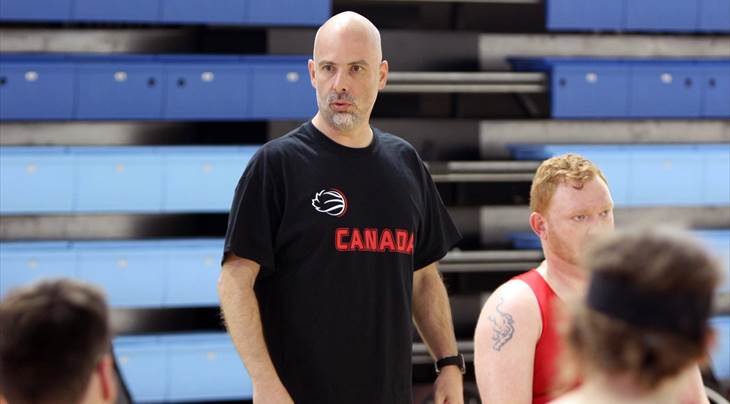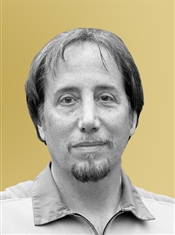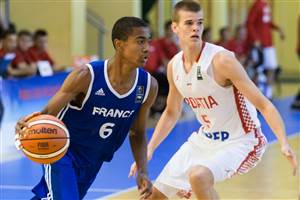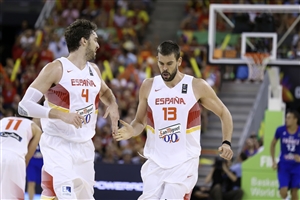
Matteo Feriani tasked with helping Canada get its groove back
CHARLOTTE (Steve Goldberg's Wheel World) - After more than a decade as a bench lieutenant with the national teams of Italy, Australia and Brazil, Matteo Feriani has been given the keys to Canada's men's national wheelchair basketball side with the charge to park them on the podium they once called home.
The men of the Maple Leaf had a remarkable run. They won their first Paralympic medal ever – gold – in 2000 in Sydney and then went gold- silver-gold in Athens, Beijing and London. Prior to that, the Canadian men had success in World Championship play, taking silver in 1986, bronze in ’90, ’94, ’98 and ’02, and gold in 2006.
In the dog years that Paralympic quadrennials are measured in, it's been a relatively short time that Canada have been put out on the street from their golden garage. But that dispatch wasn't just out on the driveway; they were kicked to the curb, finishing 11th out of 12 teams in Rio and missing the last IWBF World Championships in 2014 altogether.
Much of the engine that drove them for a more than a decade - Patrick Anderson, Joey Johnson, Richard Peter, David Durepos - had retired after London. They had a sneak peak at that reality in the 2010 World Championships where, without Anderson, they finished 7th. He came back for London and…
So now it's up to Feriani to help Canada get its groove back. And he may just be the right person for the job.
The 42-year-old native of Padua, Italy began coaching wheelchair basketball when he was 25, introduced to the game by a friend while he was coaching a fourth division adult side and some junior teams in his home town.
He was immediately intrigued by the game and the challenges it presented.
Wheelchair basketball is more spectacular because it's more technical.Feriani
Matteo told me this on a call from his home in Brazil. He'll be moving his wife and three children to Canada soon.
"You need to understand the wheelchair as well as your teammates to get the position that you want. The tactical aspect is something that fascinates me because you have to be more focused on the teamwork than the individual."
"It is more challenging to a coach."
That challenge has stamped more than a few pages in his passport.
Brazil assistant coach Matteo Feriani consoles Argentina's Adolfo Berdun at the 2015 Parapan American Games in Toronto. Argentina had won the bronze medal but missed out on Paralympic qualification. Photo by Steve Goldberg/SCS Media.
Feriani's previous national team bench work began in 2005 with the Italian men at the European Championships and broadened to include the Italian women's squad and the U22 men. By 2010, he had relocated to Australia where he was an assistant for the Aussie men that won gold and silver respectively at the 2010 World Championships and 2012 Paralympic Games.
After London, he headed to Brazil to work with the men's team who were automatic qualifiers as the host team and eager to up their game on home soil. Improving from 10th in Athens to 8th in Beijing, the Brazilian men didn't make the London games.
They would defeat traditional power Australia to finish 5th in Rio, their highest ever placement.
While he hasn't been the head man for a national team until now, he has held that position for club teams in Padova and Vicenza, Italy; Bilbao, Murcia and Sevilla in Spain; Brisbane, Australia; and most recently, São José do Rio Preto in Brazil, winning titles and trophies in all but Australia.
His Canadian connection actually began at the University of Illinois back in 2006 when he attended a camp there and met then-Illini coach Mike Frogley, who is currently the director of Canada's national development academy, and a former Canadian Paralympic player (1992) and coach (2000, 2004, 2008).
He was immediately drawn to Frogley's mad scientist approach to the game that mirrored his own approach of constantly breaking it down, looking for new ways to innovate and improve. They stayed in touch.
"In 2015 we started talking more about how wheelchair basketball had been growing and developing because it has changed a lot," says Feriani.
"It's more physical; it's play more all court and you can't rest at any moment. And we are going more with the lower (classification) point or middle point players."
Matteo Feriani (right) with Mike Frogley, director of Wheelchair Basketball Canada's National Academy at a recent national team camp. Photo courtesy of Wheelchair Basketball Canada.
He noted that the U.S. team that won gold in Rio did it without depending on "big" players such as Canada had done previously with Anderson and Johnson, or Australia with Troy Sachs, Justin Eveson, and Brad Ness.
(Note: This quickly sent me to my Rio files and sure enough, his words bore out. In the gold medal match, both the USA and Spain each featured only two players with 4.0 or higher (less impaired) classifications while the bronze medal game participants Great Britain and Turkey had four each. Fifth place Brazil had four and sixth place Australia had six. Canada had five.)
That doesn't mean that Canada, which had five 4.0 or 4.5 players on the roster in Rio, will forsake the high-pointers. Two of their best young players, Nic Goncin and Liam Hickey, hold those classifications. It does mean they will be actively searching for new talent that fits where the game is going.
In spite of the experience and skill that gold medal veterans David Eng, Bo Hedges, and Adam Lancia offered in Rio, Feriani says, "the retirement of Pat Anderson, Joey Johnson and Richard Peter after London left a big hole (to fill) for the new generation in Canada."
At a recent camp for the Canadian team, he heard from some players about how overwhelming that their first Paralympics Games were. He knows that is something that only experience can deliver but, "Now they have that and we can work with that."
"My personal challenge is to be able to take this team back to a top level as they had been for many years."
"It is my first time for this with a national team but with the clubs I was always doing that. So I am not new at all with that kind of pressure."
Well respected and liked by his colleagues around the world, I'm sure they all wish him the best of luck in his new job… up to the point they have to play against him that is.
Steve Goldberg
FIBA
FIBA's columnists write on a wide range of topics relating to basketball that are of interest to them. The opinions they express are their own and in no way reflect those of FIBA.
FIBA takes no responsibility and gives no guarantees, warranties or representations, implied or otherwise, for the content or accuracy of the content and opinion expressed in the above article.
To help make this column as inclusive as possible, please send any national or international event information, story suggestions, or comments to wheelworldmail@gmail.com.

















